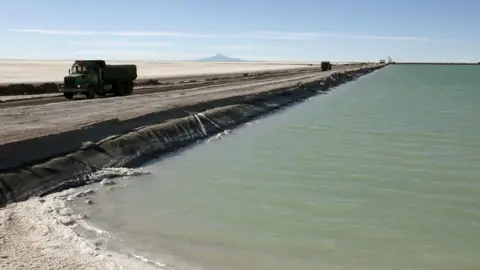A brine pool at Uyuni salt lake in Bolivia contains valuable lithium
A giant Chinese battery company, Catl, has won a bidding process to develop Bolivia’s huge lithium reserves.
The ultra-light metal is used in electric vehicle (EV) batteries, production of which is expected to soar as fossil fuels are phased out.
Bolivian President Luis Arce said the Catl-led consortium was launching the “historic” industrialisation of lithium in Bolivia.
More than $1bn (£807m) will be invested in the project’s first phase, he said.
Australia and Chile are the world’s biggest lithium producers, but Bolivia has huge reserves in the Potosi and Oruro salt flats.
Technical hurdles and a lack of infrastructure have long delayed the extraction of lithium in Bolivia, whose reserves are estimated at 21m tonnes.
Mr Arce said Bolivia was still negotiating with other foreign companies for potential partnerships. Reuters news agency says they include US firm Lilac Solutions, Russia’s Uranium One Group and three other Chinese bidders.
Mr Arce said the goal was to start exporting lithium batteries in the first quarter of 2025.
Argentina, Bolivia and Chile share an expanse of salt flats, or salars, called the “lithium triangle”, holding more than 75% of the world’s lithium deposits.
Brine is pumped from beneath the salt flats into vast evaporation pools, a process that leaves behind lithium carbonate. But the technical challenges of lithium mining have raised concerns about pollution and commercial viability in South America and other parts of the world.
Watch: The BBC’s Simon Reeve meets one of the last traditional salt miners in Bolivia’s Salar de Uyuni
Source link : http://www.bing.com/news/apiclick.aspx?ref=FexRss&aid=&tid=66d2beaefd2c43de9377c5a95d449fa1&url=https%3A%2F%2Fwww.bbc.com%2Fnews%2Fworld-latin-america-64355970&c=12632520058427093337&mkt=en-us
Author :
Publish date : 2023-12-20 18:51:00
Copyright for syndicated content belongs to the linked Source.
